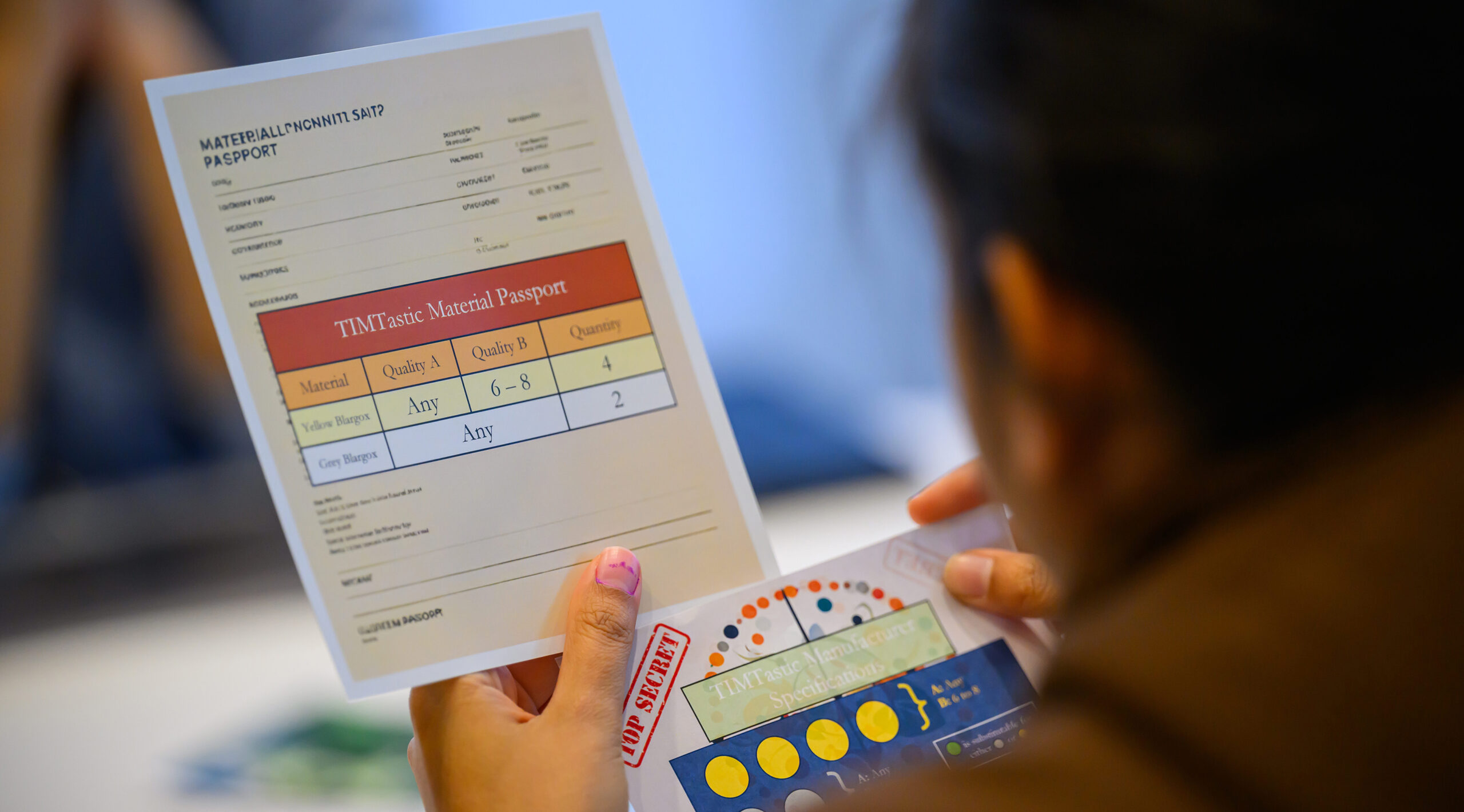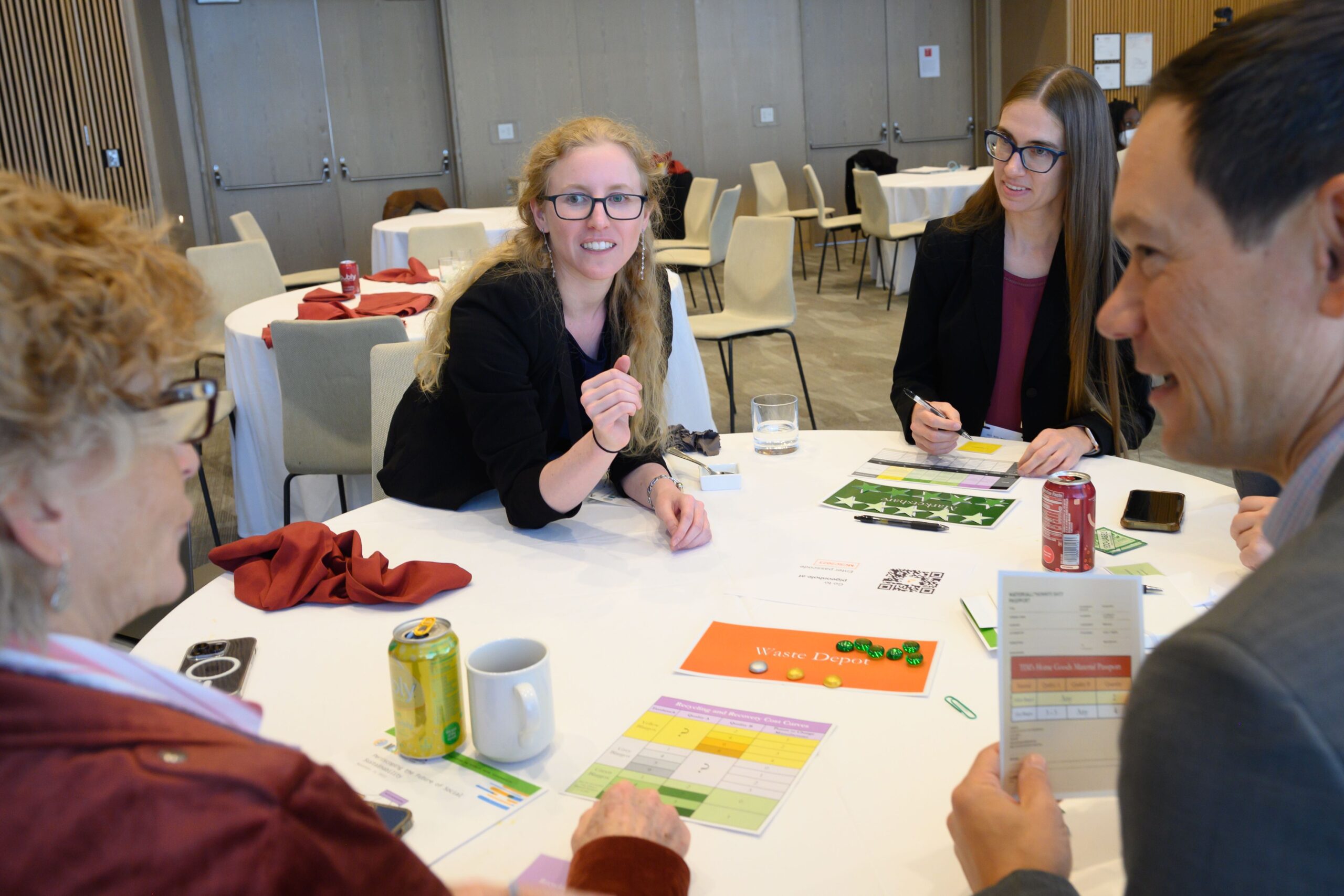6cycle: A Game Exploring Material Passports and Sustainable Supply Chains
January 17, 2024

A first-time player observing their 6cycle materials
Harnessing the power of data throughout material loops can support the transition to a circular economy by facilitating strategic supply chain management decisions. Material passports, which list all the materials in a product or construction during its life cycle, are one valuable tool for decision-makers–documenting and conserving important data that can create value at both the recycler/downstream end and the manufacturer/upstream end of a supply chain. A game, 6cycle, developed by Evan Coleman and Poushali Maji, MCSC Impact Fellows, demonstrates the use of such material passports, simulating the challenges and opportunities in building and maintaining circular supply chains.
Inspired by the classic Beer Distribution Game, which was developed at MIT, 6cycle offers a practical way of understanding the complexities of sustainable resource management in a circular economy. It aims to bring to light the intricate balance between resource recovery and material usage in an interactive and hands-on manner. Read more about the game’s set up and objectives.
Dr. Coleman and Dr. Maji spoke with the MCSC news team about their motivation to develop this game, their experiences and observations from recent 6cycle demos with students and corporate sustainability experts, and how the game’s insights might inform and support ongoing sustainability efforts within the consortium and its member companies.
Why did you decide to use a game to explore these challenges and opportunities related to circular supply chains?
We wanted a dynamic and engaging way to delve into the complexities of circular supply chains. At the same time, we recognized that traditional presentation methods and lectures often keep people within their comfort zones, particularly in their roles within supply chains. We aimed to break down these silos and create an environment where communication could be more open and collaborative. This goal is reflective of the MCSC’s larger mission to bring companies together to address core sustainability challenges that are prevalent across the industrial world, irrespective of economic sector. As such, we deliberately designed the game to be cross-sectoral, and avoided industry-specific language, to keep the learnings universal rather than confined to any particular sector like aluminum, glass, or plastic. Our intention was to empower participants to explore the entire problem space rather than just a few aspects, and embrace working toward a more holistic perspective. Through the game, we hope to help participants explore the realistic, sub-optimal solutions that arise in the zero-trust environments of supply chains.

MCSC member companies and the MIT community play 6cycle at the MCSC's Member Meetings last November.
What were your takeaways from observing people play 6cycle?
We recently had the opportunity to share the game with the current cohort of MCSC Climate & Sustainability & Scholars as well as MCSC member companies and the MIT community at the MCSC member meetings. The game’s design was intended to accurately depict real-world scenarios without making the decision space too complicated. Interestingly, this led to situations akin to a Prisoners’ Dilemma, where lack of cooperation led everyone to lose. This important observation may inform how we frame or set up the game in future scenarios. We also enjoyed seeing players really get into their roles, too. It confirmed that our outcome set isn’t constrained; we aren’t just sending one message about winning or losing. There’s a rich solution space, and the agency of individual players can drastically swing the outcome of the game in interesting ways. For example, we saw scenarios where manufacturers colluded or cooperated, and how these choices impacted the entire supply chain, from recyclers to consumers. It was enlightening to see how the format sparked new ideas and challenged participants to view supply chain dynamics in a new light. We are excited to have future opportunities to gather feedback on how the game is resonating with its players.

MCSC member companies and the MIT community play 6Cycle at the MCSC's Member Meetings last November.
How does 6cycle tie into other ongoing work and initiatives at the MCSC?
The game is very much in line with the broader goals of the MCSC. It supports and complements the work we are doing across impact pathways, including circularity, nature-based solutions, and data and computing. It addresses challenges linked to data availability along supply chains, presenting an interactive way to highlight the importance of data in making informed decisions, a key theme in the MCSC’s work. The game serves as a practical demonstration of the importance of data in circular supply chains, and exemplifies how closing data collection loops can make it easier to close material supply loops, a crucial climate challenge across industries. These themes also tie into specific efforts like MIT’s PixelFrame project, which advocates for a full-systems approach to circularity through the implementation of periodic data collection on materials within a supply chain.
More broadly, 6cycle aligns seamlessly with the MCSC’s objectives of fostering collaborative approaches to sustainability challenges. It offers a tangible, interactive way to understand and address the complexities of circularity, bridging the gap between theoretical research and real-world application. This initiative enhances our efforts to bring together diverse companies to strategize around common sustainability goals, reinforcing the MCSC’s mission of collaborative innovation.
Interested in playing the game? CLICK HERE to download the pieces and instructions.
